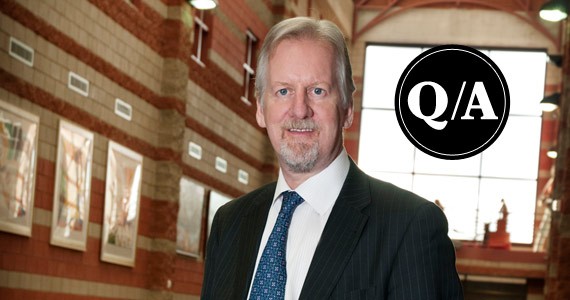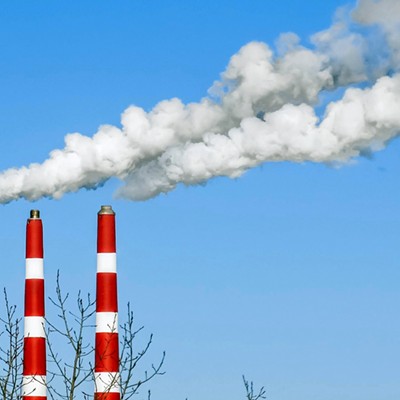After two weeks of intense public meetings, the final report on fracking in Nova Scotia will be released by the province’s advisory panel later this month. The head of that panel, and president of Cape Breton University, Dr. David Wheeler took time away from his print deadline to speak with The Coast about what he’s learned.
The Coast: How did the public meetings go?
David Wheeler: I thought they were very informative. I think people at the panel meetings were, obviously, for the most part very well informed and often passionate in their view. So, that was very much appreciated by me, and I think by the entire panel. Of course, we discussed it quite a bit in terms of what feedback we were getting. I think they were very successful, and I think the feedback on the recommendations—or the emerging recommendations—were helpful. I think it allowed us to clarify some of the ways we were describing what we were saying in ways that were better understood, perhaps. So, I think it was very worthwhile doing.
TC: Were you surprised at all by the reaction of the communities?
DW: No, we always knew that people would be very passionate. Some people even said that maybe we should consider not doing public meetings, but from my point of view, right at the beginning, I declared that it was important that we did that. It was important to involve Nova Scotians in debating the emerging recommendations of the panel. I've done similar things like this in the past, perhaps it wasn't quite so lively, but there were occasions where it did get lively on both the energy efficiency work I did in 2008 and the renewable electricity work I did with Michelle Adams in 2009. People. I think, bring strong views to bare, and that's right and proper. I did regret, I think, a handful of interventions which crossed a line in terms of calling to question the ethics of the panel or individual members of the panel. I think that was inappropriate. But that was a very, very small number of people and I don't think representative of the broad range of attendees, who actually were pretty respectful of the process and pretty well informed. That was what I take away from it, rather than the very, very small number of people who were more into questioning personal ethics or the ethics of the panel.
TC: That's come up recently with you chairing LearnCorp [a firm responsible for training oil and gas workers], and you say that doesn't bias you?
DW: No, anyone who knows me knows that I bring a level of seriousness and objectivity to all topics of energy and the environment. Again, I think more people would have been concerned about my historic links with the environmental movement, rather than this industry. But, not everyone is familiar with my CV, I guess.
DW: I didn't even think of it. I didn't think it was an issue. When I was being asked to do this by the province, as a favour to the province, unpaid and voluntary, the last thing I was thinking about was what I might have done in the past or what I'm doing currently when there is actually no conflict of interest. So, it never came up. I didn't think about it, and anyone who wants to create an impression of a conflict for particular reasons obviously can do with any public servant. Anyone who looks down my CV will see many, many activities I've done in the past which, in theory, if you wanted to create an impression of a conflict, you could do that. I could list you lots and lots of examples of where my involvement with environmental organizations, social justice organizations and others could be portrayed as anti-the oil industry by someone who wanted to make that link. But it wouldn't be fair and it wouldn't be accurate. My track record, I think, speaks for itself. So, I have no regrets. I'm not in a conflict, and I never thought that in taking on a tough, voluntary and unpaid job for the province anyone would ever position my role in that way. I guess, it's an interesting topic this one, where people throw all kinds of things at you.
TC: You said now that no fracking should proceed in Nova Scotia before more public discussion and research. Why?
DW: Well, I think there's a real need to learn from all the evidence that our panel's been able to look at on the topic of hydraulic fracturing. That's really why we've come to the conclusion that the province is not ready at this time to entertain hydraulic fracturing until there has been a much broader debate and discussion. What we're saying is that should happen at the provincial level of course, but just as importantly, it should happen at the community level. Whether that's municipalities, whether it's Aboriginal communities, because these are important issues. We need people to be fully informed of the risks, both direct and hypothetical risks. We also need people informed of the potential benefits. Then we need to apply a Nova Scotian lens to what that looks like at the community level. Time is required for those discussions and debates. Until those discussions and debates have occurred, we don't think it makes any sense, whichever side of the fence people are on, to just crash things through. I'm sure the government would not wish to crash things through arbitrarily. That doesn't strike me as being sensible for them, for communities or even for industry. What is required at this point is a deep discussion amongst Nova Scotians about the issues so we can all learn together.
TC: Was this advisory panel process supposed to find an answer though? One way or another, yes or no? More study seems likely to anger both sides.
DW: Well, it shouldn't, because all sides should recognize, including the government, that it would be inappropriate to proceed with significant unknowns, particularly at the community level. One thing we have been able to identify is where would be of potential interest to industry. That's one of the advantages of having people involved in the panel who understand the industry at a deep level. We've been able to determine where the likely interest would be, down to the level of particular oil and gas reservoirs. It would have been impossible for us as a panel, to go down to that level of granularity and say, okay, what would this mean in Cumberland County, or what would this mean in Colchester County? Or in Hants County? We weren't able, because of resource constraint, to go into that level of detail, in terms of okay, if this industry ever did take off in those areas, what would be the implications for other economic activities, tourism, forestry, fisheries, so on? What would be the implications in terms of economic impact, both positive and negative in those communities? So, really unless you go to that level of detail, again it's impossible for local communities or the province to take a view. So, what we're saying is, once we've had a period of reflection, hopefully based on the results of our review, then if anyone wants to take it forward, that's the level of analysis one would need to go into. What would this mean to Cumberland County? And the people who should be involved in that would be the people of Cumberland County. Their views are paramount in that kind of conversation. Again, people may be disappointment by saying postpone it forever, and/or go ahead. But actually if people are more thoughtful, they will see why if you apply the precautionary approaches we've done, and as actually we're bound to do in Nova Scotia legislative terms, because of Environmental Goals and Sustainable Prosperity Act, if you apply that precautionary approach, there is no alternative other than simply taking time to absorb what information is out there, and then to think about if this ever does occur, what it would mean at the community level.
TC: If the province decides to allow fracking, which obviously is out of your hands...
DW: Again, we've been very careful not to overstep the bounds here. You know, the province, when it receives this report, has all options open in terms of how it decides to move. That's how it should be in a democracy.
TC: But, if they were to allow fracking, what regulations or rules jump out to you as being needed?
DW: Well, you'll have to wait for our report to answer that question. But I can tell you in general terms. We are, the panel's still debating this, but hopefully we'll have finished debating in the next few days so we meet our print deadline, but we're talking about very strict, if, capital “i,” capital “f,” if this every happened in our province, everything is then contingent. If this ever happened, then clearly one would be talking about the most stringent regulations that are out there as best practices in Canada. We've also created this notion of a community consent to proceed, which is hard-wiring the ability of communities to be empowered and involved in decision making. Again, whether you take an industry perspective, or a community perspective or the government perspective, that makes sense because you would not want to proceed against the wishes of local people. It wouldn't make any sense. So, we've created, if you like, two levels of what we hope will be reassurance for Nova Scotians. One, of course will be filling out best practices in legislation and regulation, and making clear it's not just about having regulations, it's about funding them resourcing them and enforcing them. Which was a big concern from the stakeholders we heard from at the hearing. It's about having the best regulations, but it's also about resourcing and politically following through regulations. Secondly, we've created this notion of a community-consent to proceed, which I think again is important for people to understand and that will require some design work. We haven't been able to be prescriptive on that, but we have drawn attention to some principles that would need to be in play, defining, sort of what it means to be a community. Again, that's up to politicians and municipalities and the province itself to come to a view on.
TC: Have your own opinions about fracking changed through this process?
DW: Well I've learned a lot.
TC: Like what?
DW: Well, I've learned a lot of technical details about hydraulic fracturing. I've obviously kept a completely open mind, as you'd expect, as the independent chair of this process. People may be surprised to learn this, but I've enjoyed the process. It's been, for me, an important piece of public service. I've learned a lot, so in the future I’ll be able to speak more knowledgeably about hydraulic fracturing. For someone interested in sustainability, like I am, for someone interested in the future of Nova Scotia, like I am, it's important that I become more knowledgeable, and I'm hoping that lots more people become more knowledgeable in months to come.












